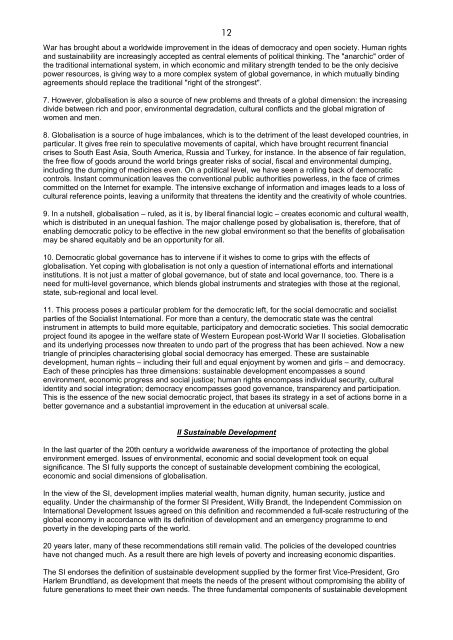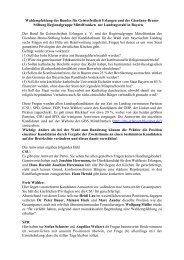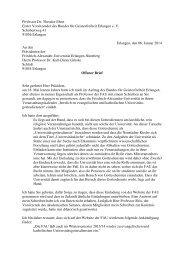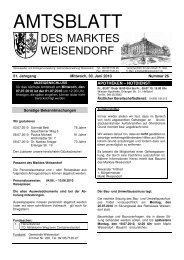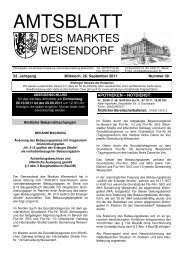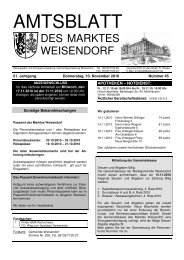Globalisierung - Realität und Ideologie.pdf - FEN
Globalisierung - Realität und Ideologie.pdf - FEN
Globalisierung - Realität und Ideologie.pdf - FEN
Sie wollen auch ein ePaper? Erhöhen Sie die Reichweite Ihrer Titel.
YUMPU macht aus Druck-PDFs automatisch weboptimierte ePaper, die Google liebt.
12<br />
War has brought about a worldwide improvement in the ideas of democracy and open society. Human rights<br />
and sustainability are increasingly accepted as central elements of political thinking. The "anarchic" order of<br />
the traditional international system, in which economic and military strength tended to be the only decisive<br />
power resources, is giving way to a more complex system of global governance, in which mutually binding<br />
agreements should replace the traditional "right of the strongest".<br />
7. However, globalisation is also a source of new problems and threats of a global dimension: the increasing<br />
divide between rich and poor, environmental degradation, cultural conflicts and the global migration of<br />
women and men.<br />
8. Globalisation is a source of huge imbalances, which is to the detriment of the least developed countries, in<br />
particular. It gives free rein to speculative movements of capital, which have brought recurrent financial<br />
crises to South East Asia, South America, Russia and Turkey, for instance. In the absence of fair regulation,<br />
the free flow of goods aro<strong>und</strong> the world brings greater risks of social, fiscal and environmental dumping,<br />
including the dumping of medicines even. On a political level, we have seen a rolling back of democratic<br />
controls. Instant communication leaves the conventional public authorities powerless, in the face of crimes<br />
committed on the Internet for example. The intensive exchange of information and images leads to a loss of<br />
cultural reference points, leaving a uniformity that threatens the identity and the creativity of whole countries.<br />
9. In a nutshell, globalisation – ruled, as it is, by liberal financial logic – creates economic and cultural wealth,<br />
which is distributed in an unequal fashion. The major challenge posed by globalisation is, therefore, that of<br />
enabling democratic policy to be effective in the new global environment so that the benefits of globalisation<br />
may be shared equitably and be an opportunity for all.<br />
10. Democratic global governance has to intervene if it wishes to come to grips with the effects of<br />
globalisation. Yet coping with globalisation is not only a question of international efforts and international<br />
institutions. It is not just a matter of global governance, but of state and local governance, too. There is a<br />
need for multi-level governance, which blends global instruments and strategies with those at the regional,<br />
state, sub-regional and local level.<br />
11. This process poses a particular problem for the democratic left, for the social democratic and socialist<br />
parties of the Socialist International. For more than a century, the democratic state was the central<br />
instrument in attempts to build more equitable, participatory and democratic societies. This social democratic<br />
project fo<strong>und</strong> its apogee in the welfare state of Western European post-World War II societies. Globalisation<br />
and its <strong>und</strong>erlying processes now threaten to <strong>und</strong>o part of the progress that has been achieved. Now a new<br />
triangle of principles characterising global social democracy has emerged. These are sustainable<br />
development, human rights – including their full and equal enjoyment by women and girls – and democracy.<br />
Each of these principles has three dimensions: sustainable development encompasses a so<strong>und</strong><br />
environment, economic progress and social justice; human rights encompass individual security, cultural<br />
identity and social integration; democracy encompasses good governance, transparency and participation.<br />
This is the essence of the new social democratic project, that bases its strategy in a set of actions borne in a<br />
better governance and a substantial improvement in the education at universal scale.<br />
II Sustainable Development<br />
In the last quarter of the 20th century a worldwide awareness of the importance of protecting the global<br />
environment emerged. Issues of environmental, economic and social development took on equal<br />
significance. The SI fully supports the concept of sustainable development combining the ecological,<br />
economic and social dimensions of globalisation.<br />
In the view of the SI, development implies material wealth, human dignity, human security, justice and<br />
equality. Under the chairmanship of the former SI President, Willy Brandt, the Independent Commission on<br />
International Development Issues agreed on this definition and recommended a full-scale restructuring of the<br />
global economy in accordance with its definition of development and an emergency programme to end<br />
poverty in the developing parts of the world.<br />
20 years later, many of these recommendations still remain valid. The policies of the developed countries<br />
have not changed much. As a result there are high levels of poverty and increasing economic disparities.<br />
The SI endorses the definition of sustainable development supplied by the former first Vice-President, Gro<br />
Harlem Br<strong>und</strong>tland, as development that meets the needs of the present without compromising the ability of<br />
future generations to meet their own needs. The three f<strong>und</strong>amental components of sustainable development


